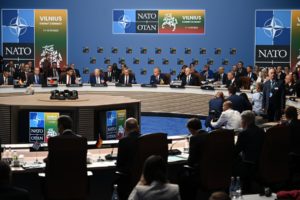Ahead of the summit, the NATO Secretary General Jens Stoltenberg announced that most allies are expected to announce their commitment to increasing defense budgets to more than 2% of the gross domestic product starting in 2024. Only 11 member states, including Romania, have met this request starting this year. According to analysts, beyond the Ukrainian file, the North Atlantic meeting will be marked by the announcement of Sweden’s admission to NATO.
On the eve, the NATO Secretary General Jens Stoltenberg stated that the Turkish President, Recep Tayyip Erdogan, agreed to support the accession of the Scandinavian kingdom, a move that he opposed for months in a row. Stoltenberg described the day as „historic”. Asked about Hungary’s opposition to Sweden’s accession, Stoltenberg said that the problem was solved, because the authorities in Budapest had informed him that they did not want to be the last to ratify the protocol. At present, all 31 NATO member states want Sweden to join the Alliance, as does neighboring Finland, which was admitted on April 4. After the launch of the Russian invasion of Ukraine on February 24, 2022, the two Scandinavian countries renounced their strict neutrality, maintained for decades, and opted for joining NATO.
Turkey had given the green light to Finland, but had blocked the accession of Sweden, which it accused of hosting Kurdish militants, described by Ankara as „terrorists”. President Erdogan would have wanted to condition the admission of Sweden on the negotiations regarding his country’s accession to the European Union. Turkey submitted its application for accession to the European Economic Community, the forerunner of the current community bloc, in 1987 and to the Union in 1999.
Accession negotiations began in 2005 and, ever since, Brussels has not tired of repeating that Ankara does not meet the admission criteria. Admission to NATO and to the EU are two processes that have nothing to do with each other – repeated, on Monday, the EU deputy chief spokesperson, the Romanian Dana Spinant. The EC’s latest communiqué on this topic dates to 2022 and stated that the European Union had serious concerns on the continued deterioration of democracy, the rule of law, fundamental rights and the independence of the judiciary in Turkey.
Bogdan Matei, Radio Romania International










